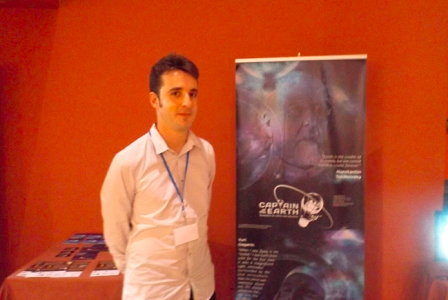Erstellt am: 27. 9. 2014 - 11:09 Uhr
Rock stars, astrophysicists, cosmonauts and atheism
Starmus on FM4
Listen to a Reality Check Special with Johnny Bliss doing interviews with people from an exquisite science conference in Tenerife.
Saturday, September 27th, 12-13, and after that seven days on demand.
So Richard Dawkins and Brian May (from Queen) walk into a bar, where the bartender is talking with two American astronauts. Stephen Hawking looks on from a table in the corner. This sounds like the beginning of an extremely convoluted joke. But no: Variations on this scene have been occurring all week on the Spanish island of Tenerife, which is part of the Gran Canaria island chain, just off the Moroccan coast. I've not only been here to bear witness, nay, I have also been here to take part in conversations about theoretical physics, astronomy, the Big Bang, and many other topics that actually are well above my paygrade.
Most. Surreal. Week. Ever.
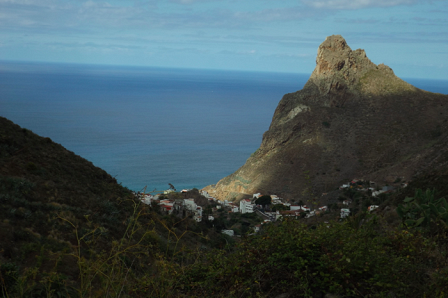
Johnny Bliss, 2014
The Starmus Conference took place for the first time back in 2011. It was much smaller then, although it boasted an equally impressive lineup. Neil Armstrong appeared on stage, at a public event, for the final time ever ... and for the first time ever with Buzz Aldrin since 1969.
Now it is three years later, and word has spread. Where the first event had barely 300 participants, this year there were nearly a thousand. This seems to have caught the event organizers by surprise, and as a result, the whole enterprise is much more chaotic and disorganized than anyone who'd been to the first Starmus (myself not included, but I did talk to a lot of people whose expectations had been frustrated) expected.

Johnny Bliss, 2014
In one way, that is good; everybody hangs out in the same public space, and is extremely accessible. For one lecture, I was seated next to Stephen Hawking. When we went for dinner one night, we could see Richard Dawkins eating only a couple of tables away. Brian May from Queen was just everywhere, and if you want to meet one of the astronauts from American Apollo missions, you need go no farther than the local bar where you'll find them nursing beverages of their own.
In my experience, this kind of access and shared space with "famous" people is practically unheard of; it's the same as if you were to go to an ordinary music festival, and between sets just happened to find yourself standing at the bar with David Bowie, KRS-One and Iggy Pop. I mean, it can happen, but it usually doesn't.
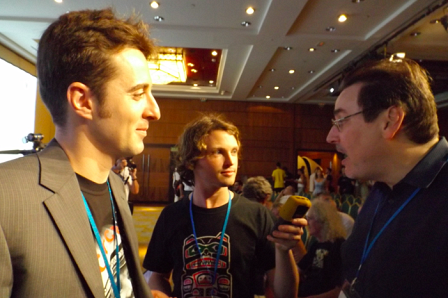
Johnny Bliss, 2014
Is that a byproduct of this year's event being badly organized, or is that simply part of the magic and beauty at the heart of Starmus? Apparently, both. Not only does the event bring us closer to the stars, with lectures about asteroids, the Big Bang, and missions to the moon; it also brings us closer to the stars, so close in fact that we can watch them eat, socialize, react to different lectures, and (if we're lucky) pick their own noses.
One downside of this is that "famous" people are constantly deluged with eager fans begging for a signature, a photograph, or an answer to this or that science question; many attendees, press or otherwise, have absolutely no respect for social norms, and rudely barge in, elbowing each other out of the way, and even worse (especially for poor Stephen Hawking) taking constant flash photographs literally ALL THE TIME, to the point where Stephen Hawking's nurses had to aggressively stand in the way and tell said plebian paparazzi, in no uncertain terms, to fuck off.
Members of the press have no recourse to setting up an interview in the traditional way (through the festival organizers) and have to literally battle their way through a jungle of other over-eager journalists to this or that harried famous person. For example, when I asked Brezo Rodríguez from the press department about organizing an interview with one of the astronauts, she answered that "this is Spain" and "to think of it like a bullfight"*, which is so bizarre I can't even.
* Brezo obviously had no idea of what a bullfight actually entails, as a matador's contest against a bull is a carefully choreographed battle of one (with a small support team) versus one (with horns and several hundred kilograms of mass), and a much more civilized affair than the baboon jostling I encountered on the conference hall floor.
Events get cancelled and delayed, information comes late or wrong, and perhaps the most unapproachable people at the whole event are on the organizing team assigned to help us. But for all that, I do not mean to diminish any of the participants, lectures, or events, which are in themselves (by and large) genuinely awe-inspiring. Some of the most impressive people I've ever met in my life are here; Harry Kroto, for example, the Nobel prize-winning chemist and humanist, best-known for discovering the fullerine class of molecules - complex arrangements of carbon that form the foundation of modern nanostructured materials - and also happen to be found in OUTER FUCKING SPACE. Elegant and intelligent as all hell, he is, to quote a good friend, "a prince of a man", for reasons that will become clear as this story goes on.
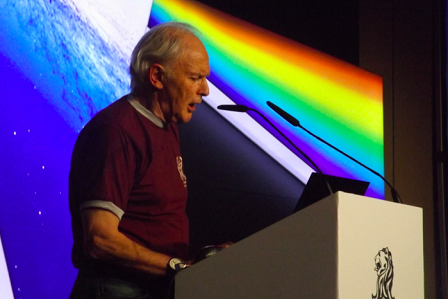
Johnny Bliss, 2014
The event officially started on Monday, the 22nd of September. However, I arrived the day before. Let's have a look at my extensive notes ...
Sunday, the 21st of September
I arrived in the late afternoon from the other side of the island, where I'd been backpacking for the previous few days. I took a long sweaty bus ride through the afternoon heat, and begged the bus driver to tell me when we reached Abama, the site of the Ritz-Carlton hotel where the event is hosted. Naturally, being a Spanish bus driver, he forgot to tell me and it was on some of my fellow passengers to tell me when we'd missed the stop. By the time I got to the front of the bus to confirm this, we'd covered quite some distance, resulting in me having to literally hitchhike back.
* * Frothing tiredness is a thing. Look it up.
I was in a state of frothing tiredness* * by the time I finally did arrive, but fortunately it would appear that just about everyone who had already arrived was on the same boat, organizer and delegate alike.
I met my friend and aspiring cosmonaut, Ilya Baykin, in the hotel lobby. He works for the Captain of the Earth Foundation for Culture and Education in Moscow, promoting Russian Cosmism and humanism all over the world.
More importantly, without this man, I would not have ever learned about this event, or organized to come here. He got me all excited about an event with Stephen Hawking and Brian Eno (the latter of whom ended up not coming after all, but I suppose Brian May will do) and gushed about the atmosphere and visionary spirit of the event until I came on-board.
* * * A little later that night, that is exactly what we ended up doing, in the company of Stephen Hawking and any number of other delegates.
Ilya is, like me, a social engineer of sorts. He brings people together who would otherwise never meet. I think he is most at home at a VIP event with an ever-flowing glass of champagne, and a bunch of highly interesting strangers he can pontificate with/to* * *.
Even though the event had not formally begun, perhaps this was the most interesting time - the masses had not yet arrived, and everybody was still more or less relaxed. Off in the corner, I caught my first glimpse of Stephen Hawking and a group of hangers-on. Before I even drank my first cup of recovery-coffee, Ilya had introduced me to Harry Kroto and we'd gotten into an intense conversation about the Space Elevator and why nano-technology is not developed enough yet to make it happen.
* * * * The word is, he is a very important astronomer, and if you've never heard of him, you have been living in a very deep cave.
Shortly thereafter, we were on a balcony drinking glasses of wine and chatting up Robert William* * * *'s wife. Soon after, Brian May, Stephen Hawking, and a bunch of other instantly recognizable people turned up and socialized around us like it was no big thing. I kept expecting for some muscle-y guy to show up, demand to see my credentials, and throw me out, but no, apparently I was allowed to be there.
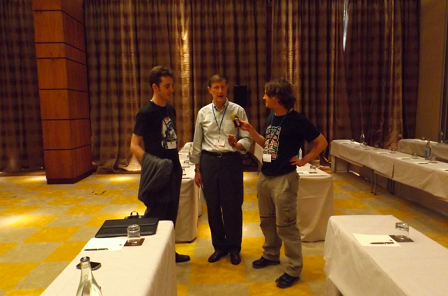
Johnny Bliss, 2014
+ Ilya says that this is the kind of thing that happens at any Good Restaurant, but we don't ever eat at those, do we?
This was followed by dinner at a ridiculously expensive and high-end Argentinian restaurant, where this Aussie guy named Lenny (who advises people like Tony Abbott on healthcare in indigenous communities) and Harry Kroto discussed climate policy, and why Monty Python are the most important comedy troupe of the 20th century. The restaurant was so very high-end that when you ordered a glass of wine, they would pour a little of it out for you to sniff at before they filled your glass+. Richard Dawkins made an appearance and HOLY COW I'VE SEEN RICHARD DAWKINS EAT and he doesn't even hold the fork properly.
From there, we went to our new home in a hotel a couple kilometres away, a very strange French-owned place where nearly every other guest was from France. A little cheaper than the Ritz-Carlton, it is nevertheless very big, and has an atmosphere that is a cross between the hotel in The Shining and something you would find in the former Soviet Union, with a large outdoor pool I have not yet visited even once (I blame the physicists).
A couple mojitos later, we finally went to sleep.
Monday, the 22nd of September
I had slept very well this night, so if things would continue being surreal (they did), I could no longer blame it on being under-slept.
Lectures on Monday came from Robert Wilson, a physicist and Nobel laureate; David Eicher, the editor of Astronomy Magazine in the US; Katerina Harvati, an anthropologist specializing in neanderthals, and the only woman on the entire line-up; and Richard Dawkins.
This was also the day where I inadvertently got seated next to Stephen Hawking (I was there first!). As cool as this sounds, it also produced the most obnoxious day of the whole conference, because whenever there'd be a break between speakers (and often, astonishingly, during the lectures themselves), all manner of people, mostly journalists, would appear and take A THOUSAND PHOTOGRAPHS of the guy, ALL WITH FLASH, all the time. So I was basically constantly blinded, embarrassed about being a journalist, and feeling really sorry for Stephen Hawking.
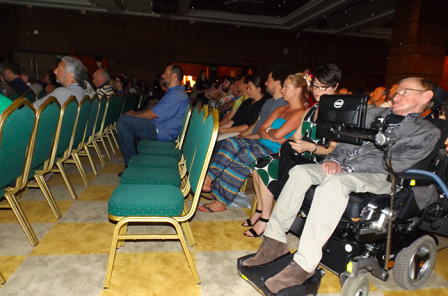
Johnny Bliss, 2014
Yes, I also took a picture that day. ONE. ONE PICTURE WITH FLASH, and then I let it go because it was a good picture and I don't need to take the same picture over and over again ten thousand times.
Between lectures one time, I was caught up on the way back from the restroom in the massive crowd of photographers and had to stand there waiting for people to move. Stephen made eye contact with me then, and I looked back at him, and I felt that we shared a moment, surrounded and trapped by all these obsessive-compulsive sociopaths with cameras.
While we're on the topic of Stephen Hawking, to his credit, he was remarkably good-natured about the whole thing, as far as I could tell. He certainly didn't run anybody over; God knows (oops, sorry Dawkins!) I would have done so in his place. But more to the point, he was clearly interested in the lectures, and during Dawkins' lecture in particular, I saw that he was reacting to it visibly, communicating with his nurse, with his computer voice occasionally blurting out "yes" or "no".
I would love to know what he was thinking.
As to Dawkins, in person he comes across much friendlier and more agreeable than he sometimes does on the internet; his speech on the likelihood of life in the solar system was well-presented, although I got the feeling that he sometimes equated correlation with causation in the conclusions he came to. (Not that I think I would be intellectually up to the task of debating him on any of his points. He would eat me for dinner.)
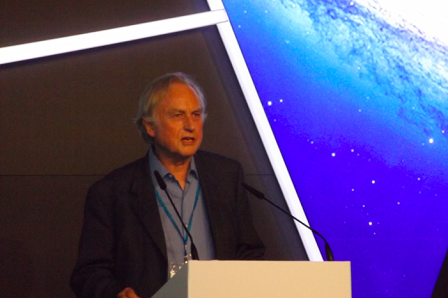
Johnny Bliss, 2014
Later on, we saw him randomly hanging out in the hotel, and Ilya asked Dawkins some question about epigenetics, whatever those are. Apparently Dawkins said something dismissive about them in his presentation, and Ilya challenged him on the topic. Dawkins' retort sounded intelligent enough, but what it came down to was "I've already addressed this in a different paper, so I'm going to cite that paper and tell you to go read it" and in that way he managed to shut the argument down. Later, Ilya found and read that paper, and it was pretty much the same as the presentation he'd just delivered. In other words, his response to Ilya's question essentially came down to, "you weren't paying close enough attention during the talk. If you had been, you'd realize I was right". Typical Dawkins.
Tuesday, the 23rd of September
++ Said film was scored by Brian May, and had some reasonably decent cinematography but otherwise was (IMO) contrived rubbish.
The conference today was in a larger venue with a bigger stage, about half an hour away by bus from the Abama hotel. I suppose this was to lend more gravitas to Stephen Hawking's lecture; or maybe it was for this really crappy film about an asteroid apocalypse that rounded off the evening++.
Mr. Hawking's lecture had gravitas aplenty; although I'd read his lecture on the Origin of the Universe before, and it was essentially exactly the same as the one on the internet, there is still nothing like watching as this highly-intelligent living monument of a guy delivers an impassioned speech, using only an automated computer voice controlled by movement of his eyelids. The whole affair had this science fiction feeling, but since it was real, I suppose that makes it rather science nonfiction. Something to experience though, for sure. Hairs went up on the back of my neck.
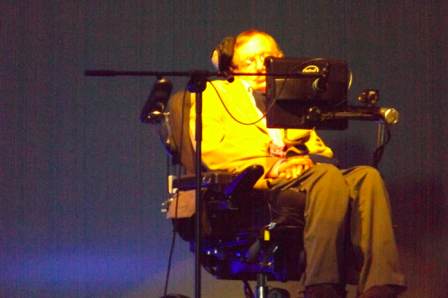
Johnny Bliss, 2014
What else happened that day? Brian May (from Queen) did this presentation in 3D (with special science-based 3D glasses) showing how stereoscopic photographs have been used to make three dimensional images out of two dimensional ones since the late 19th century.
The presentation was pretty visual, and there were a lot of impressive images of space rocks and planets featured, but I definitely got the feeling that Dr. May felt himself to be on unsteady footing here. He seemed more than a little unsure of himself, and at one point, when everyone cheered, he made some crack about how all that was missing was a guitar solo.
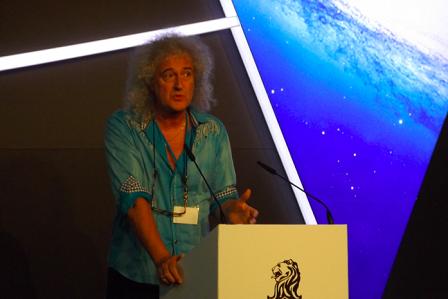
Johnny Bliss, 2014
I think he is all too aware of the fact that everyone looks at him as a musician rather than as an astrophysicist, and that produces insecurity in him. Friday night we saw him on stage with a guitar, in his natural environment, and he was completely in control of the audience, full of confidence, vital and alive; the impression couldn't be more different. Maybe it's a bit like if Richard Dawkins would get on stage with an electric guitar and do a rock show. (Actually, I think Dawkins SHOULD do that.)
I've already mentioned that the night closed out with a screening of a film about the world getting destroyed by an asteroid... but before that happened, a real-life scientist by the name of Mark Boslough came on stage to provide a rigorous, and quite fascinating, presentation about the frequency of such near Earth impact events and why it's important to develop a proper warning system. He did not fear-monger, not even a little bit, but rather made a reasonable case looking at the greater picture.
Wednesday, the 24th of September
The last proper day of the conference was Wednesday. Although it has carried on since then with excursions, concerts, and parties around the island (and even to the neighbouring island of La Palma), no longer would attendees be spending their entire afternoon sitting in conference rooms and listening to beautiful space people expound on their theories of the origin of the universe, alien life, or the future of mankind.
This makes it a good thing that Wednesday was by far, bar none, the most interesting and exciting day on the agenda.
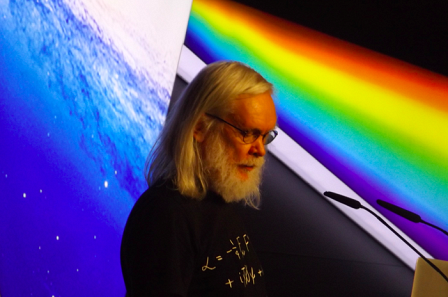
Johnny Bliss, 2014
+++ Yes, as in the 'Higgs buffalo'. No typos here.
There was a particle physicist from the UK named John Ellis, who would talk in depth about the Higgs bison+++. Meanwhile, Nobel laureate Harry Kroto would finally make his presentation, a cross-the-board lecture on general chemistry and critical thinking, combining the spirit of a stand-up routine with the rigorousness of serious science. Does that sound weird? Well, maybe it was, but it also worked brilliantly.
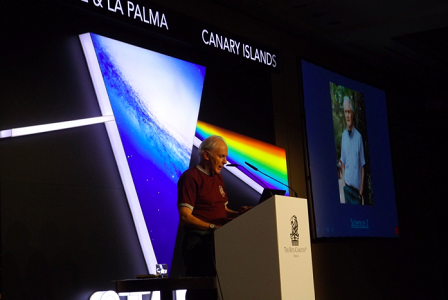
Johnny Bliss, 2014
And then there were two astronauts; Walt Cunningham, who flew on the Apollo 7 space mission, and Charlie Duke, who went all the way to the moon as a part of the Apollo 16 mission.
All of the presentations were quite solid, and well-articulated to boot, but before the main program of the day got underway, there was a press conference Q&A featuring the two astronauts and Harry (Kroto). Most of the questions were directed to Walt and Charlie and directly referred to the time they spent in space. Even I got in a question about sleeping in space, and how difficult it was to get used to (very difficult, apparently).
But then, in a brief lull between questions, Harry himself asked the moderator if he could pose a question to the two astronauts. Rather than asking them a question connected to their time spent in space, however, he brought up the contentious topic of climate change.
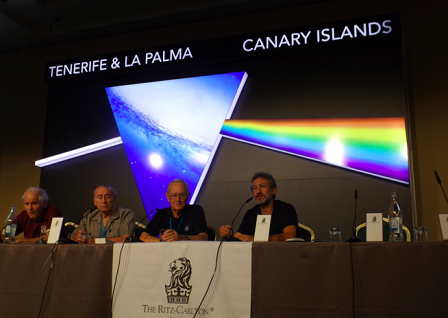
Johnny Bliss, 2014
See, as it turned out (and he knew this already), both of these men (particularly Walt) err rather on the side of not believing in manmade climate change at all; in Walt's case he had no qualms about decrying "climate change alarmists" and declaring manmade climate change to be little more than a myth. He made claims that earth had actually been cooling for tens of thousands of years. Later, when Harold asked Walt in writing to show him the evidence, things got rather tense and Walt promptly lost interest in engaging in the debate ("I'm not interested", he said).
All of this was quite interesting, but perhaps the most fascinating part of the day came later, right after Charlie Duke's presentation about traveling to the moon. He wrapped up the scientific part of his presentation, explained that he was finished, and then ... continued talking.
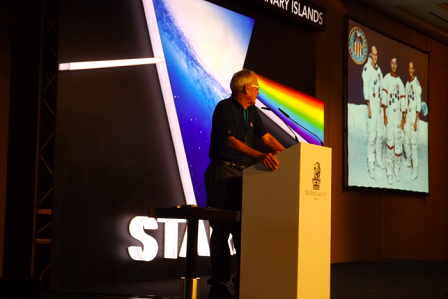
Johnny Bliss, 2014
At first, he talked about life after his return to Earth, and brought up his wife's battle with suicidal depression. Then he talked about how she accepted Jesus as her personal Saviour, and how the despair was replaced with joy. He spoke about his own conversion to Christianity, and how God delivered him from death and led people from blindness.
You could tell that the highly atheistic people (ie. almost everyone) in the room were already getting a little bit uncomfortable. This was about the point when Charlie Duke started talking about the Christian Zodiac, showing each of the signs of the zodiac in their star constellations in his slideshow presentation, and explaining what they mean in Christianity.
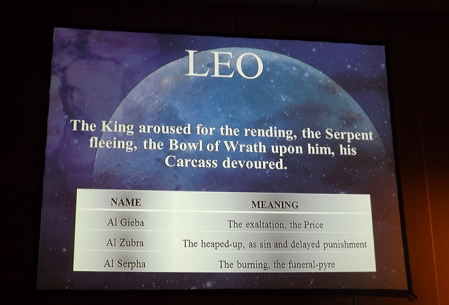
Johnny Bliss, 2014
In a strange way, Charlie had taken the role of a priest delivering a sermon, and the whole room was speechless. This went on for what seemed like a really long time; I know a girl who was sitting near Richard Dawkins, and she told me that he looked "uncomfortable ... very awkward".
When you consider how much science has become virtually synonymous with atheism, and how many of the speakers openly scorn religion, you can begin to realize what a massive Troll this was on the science community, even if Charlie didn't fully realize it.
No one knew what to do; awkward coughter was heard throughout the gallery. After Charlie eventually finished and exited stage, awkward muted silence was followed by polite applause.
I, however, applauded passionately. This is life! So off-script. So beautiful. So NOT preaching to the choir. Take that, Richard Dawkins! Yes!
FM4 Reality Check - "My Reality"-Special
My written reflections must end here, but I have produced an entire special program about the Starmus conference, featuring interviews with Astronomy Magazine's David Eicher, the astronomer Robert Williams, both Apollo astronauts, and clips from the above-mentioned press conference.
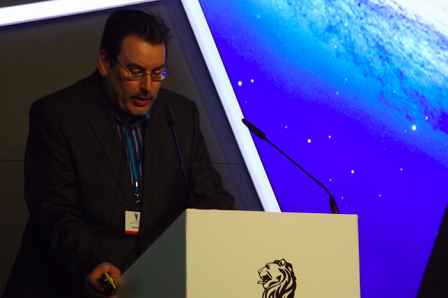
Johnny Bliss, 2014
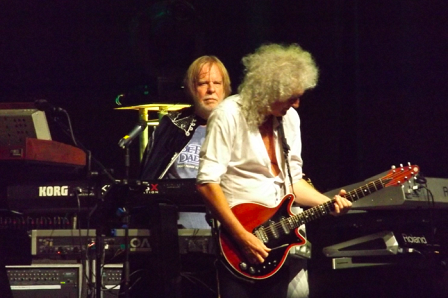
Johnny Bliss, 2014
Listen to a Reality Check Special from Saturday, September 27th, via the Reality Check podcast or at fm4.ORF.at/7tage. You can find the embedded stream at the beginning of this story.
--
Special thanks to Ilya Baykin, whose help and enthusiasm with this feature has been invaluable, and without whom this article (or entire experience, for that matter) never would have happened.



